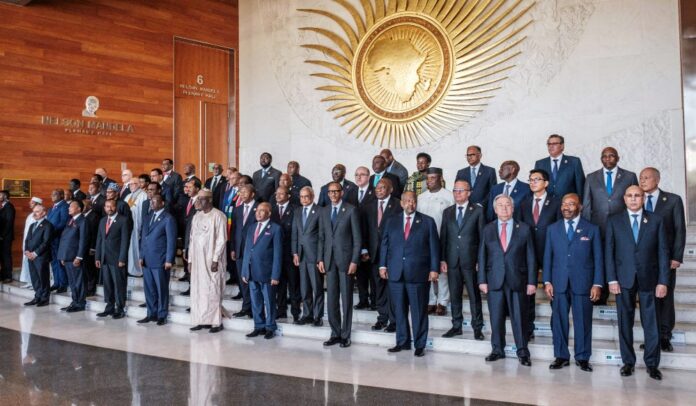ADDIS ABABA: Israel accused Iran of orchestrating the expulsion of a top diplomat from the African Union summit on Saturday, with the help of Algeria and South Africa.The incident occurred on the first day of the summit, where leaders are discussing a slew of challenges facing the continent, including a record drought in the Horn of Africa and deadly violence in the Sahel region and the eastern Democratic Republic of Congo.A video circulating on social media shows guards escorting Israel’s deputy director general for Africa, Sharon Bar-li, out of the AU assembly, which opened on Saturday in the Ethiopian capital Addis Ababa.An Israeli Foreign Ministry spokesman described the incident as “severe,” noting Bar-li was “an accredited observer with an entry tag.”He added: “It is saddening to see the African Union taken hostage by a small number of extremist states like Algeria and South Africa, which are driven by hatred and controlled by Iran.”The incident follows a long-running spat over Israel’s accreditation to the 55-member bloc.The 2021 decision by African Union Commission chief Moussa Faki Mahamat triggered a rare dispute within a body that values consensus, with powerful member states, notably South Africa, loudly protesting the move.Last year’s AU summit suspended a debate on whether to withdraw the accreditation and established a committee to address the issue, but the bloc has not said whether it would be discussed this year.An AU official said that the individual who was “asked to leave” was not invited to attend the meeting, with a non-transferable invitation only issued to Israel’s ambassador to the African Union, Aleli Admasu.”It is regrettable that the individual in question would abuse such a courtesy,” the official said.Asked about Israel’s accusations, South African President Cyril Ramaphosa’s spokesman Vincent Magwenya said: “They must substantiate their claim.”All eyes are on the AU to see if it can achieve ceasefires in the Sahel and the eastern DRC, where M23 rebels have seized swathes of territory and sparked a diplomatic row between Kinshasa and Rwanda’s government,which is accused of backing the rebels.At a mini-summit on Friday, leaders of the seven-nation East African Community pushed for all armed groups to withdraw from occupied areas in the eastern DRC by the end of next month.UN Secretary-General Antonio Guterres urged African leaders to take “action for peace.””I am deeply concerned about the recent rise in violence by armed groups in the eastern Democratic Republic of the Congo and the rise of terrorist groups in the Sahel and elsewhere,” he said.”The mechanisms for peace are faltering.”Guterres said the continent of 1.4 billion people faced multiple challenges, including “a dysfunctional and unfair global financial system that denies many African countries the debt relief and concessional financing they need.”Comoros President Azali Assoumani, leader of the small Indian Ocean archipelago of almost 900,000 people, echoed his views as he took over the one-year rotating AU chairmanship from Senegal’s Macky Sall.Assoumani called for a “total cancellation” of African debt in his acceptance speech, but did not elaborate on how this would be achieved.Guterres also announced that the UN’s Central Emergency Response Fund would release $250 million to “support some of the most vulnerable people” in the world, including those at risk of famine in the drought-hit Horn of Africa.Junta-ruled Mali, Burkina Faso and Guinea, which have been suspended from the AU, cannot participate in this weekend’s summit, but have sent diplomats to Addis Ababa to lobby for readmission.”In some countries, hard-won democratic gains are disappearing,” Guterres warned.Faki said the bloc needed to think of new strategies to counter the backsliding of democracy.”Sanctions imposed on member states following unconstitutional changes of government … do not seem to produce the expected results”.”It seems necessary to reconsider the system of resistance to the unconstitutional changes in order to make it more effective,” Faki added.The summit, largely held behind closed doors, was also aiming to accelerate implementation of the African Continental Free Trade Agreement or AfCFT launched in 2020.African nations currently trade only about 15 percent of their goods and services with each other, and the AfCFTA aims to boost that by 60 percent by 2034 by eliminating almost all tariffs.But implementation has fallen well short of that goal, with governments at odds over tariff reductions.

